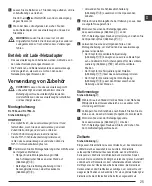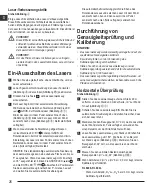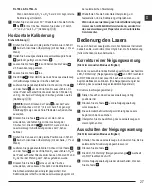
GB
13
2.
Orient the bracket mounting surface so it is approximately
horizontal.
3.
Mount one of the laser tool's attachment points (Figure
Ⓘ
)
to the bracket's 5/8″-11 mounting screw and tighten the
tightening knob (Figure
Ⓗ①
).
4.
Use any of the following parts on the Mounting Bracket to
further adjust the position of the laser tool.
•
The Vertical Fine Adjust Knob (Figure
Ⓗ⑤
) moves the
laser up and down the vertical track. The Vertical Adjust
Lock Knob (Figure
Ⓗ⑥
) secures the vertical position.
•
The Rotary Fine Adjust Knob (Figure
Ⓗ⑦
) rotates the
laser tool.
•
The Wall Tilt Adjustment Knob (Figure
Ⓗ⑧
) adjusts the
angle between the Mounting Bracket and the wall.
Tripod Mount
See Figure
Ⓚ
1.
Choose a location for the tripod near the center of the area
of interest where it will not be disturbed.
2.
Extend tripod legs as required. Adjust legs so the tripod
head is approximately horizontal.
3.
Mount one of the laser tool's attachment points (Figure
Ⓘ
)
to the tripod using a 5/8″-11 mounting screw then tighten the
mounting screw.
Target Card
See Figure
Ⓛ
Some laser kits include a Laser Target Card to aid in locating
and marking the laser beam. The target card enhances the
visibility of the laser beam as the beam crosses over the card.
The card is marked with standard and metric scales. The laser
beam passes through the red or green plastic and reflects off of
the reflective tape on the reverse side. The magnet at the top
of the card is designed to hold the target card to ceiling tracks
or steel studs to determine plumb and level positions. For best
performance when using the Target Card, the front of the card
should be facing you.
Laser Enhancement Glasses
See Figure
Ⓙ
Some laser kits include Laser En hancement Glasses. These
glasses improve the visibility of the laser beam under bright light
conditions or over long distances when the laser is used for
interior applications. These glasses are not required to operate
the laser.
CAUTION:
These glasses are not ANSI approved safety glasses
and should not be used while operating other tools.
These glasses do not keep the laser beam from entering
your eyes.
CAUTION:
To reduce the risk of serious injury, never stare directly
into the laser beam with or without these glasses.
Turning the Laser On/Off
1.
Choose a smooth, flat, level surface to place the laser.
2.
Depending on the desired application, position the laser
horizontally (Figure
Ⓐ
) or vertically (Figure
Ⓑ
).
3.
Press the key to turn the laser tool ON.
4.
The laser beings Auto-Levelling. During Auto-Leveling the
LED flashes GREEN, the rotary laser (Figure
Ⓐ①
)
flashes, the Plumb Up Dot laser (Figure
Ⓐ②
) flashes,
and the Plumb Down Dot laser (Figure
Ⓐ③
) is steady (if
available).
5.
When the Auto-Levelling procedure is complete, the
LED turns solid GREEN, the rotary laser rotates at the last
used RPM setting, the Plumb Up Dot laser is steady, and
the Plumb Down Dot laser (if available) remains steady.
NOTE: The laser tool's default Auto-Leveling mode can
compensate for an uneven surface up to 5°. If the laser tool
is not level within 5°, the GREEN
LED and the
RED
LED alternately flash. Reposition the laser
tool within the 5° limit and allow Auto-Leveling to complete.
Auto-Leveling levels the plane of the rotary laser and sets
the Plumb Up Dot laser and the Plumb Down Dot laser (if
available) perpendicular to the rotary laser plane.
Summary of Contents for Fatmax FMHT77446
Page 2: ...2 RL700L RL750L G A B ...
Page 3: ...3 1 2 1 2 60 mm 2 36 in RL 600 RL 600L RL 700L RL 750L G E C D 1 2 ...
Page 4: ...4 1 2 AA AA OPEN 1 2 _ _ 1 2 F G ...
Page 5: ...5 5 8 11 5 8 11 H I ...
Page 6: ...6 J K L ...
Page 7: ...7 N M X Y ...
Page 8: ...8 X X Y 20 m 20 m 20 m 20 m D1 D2 D0 D2 D1 O ...
Page 317: ...317 ...








































